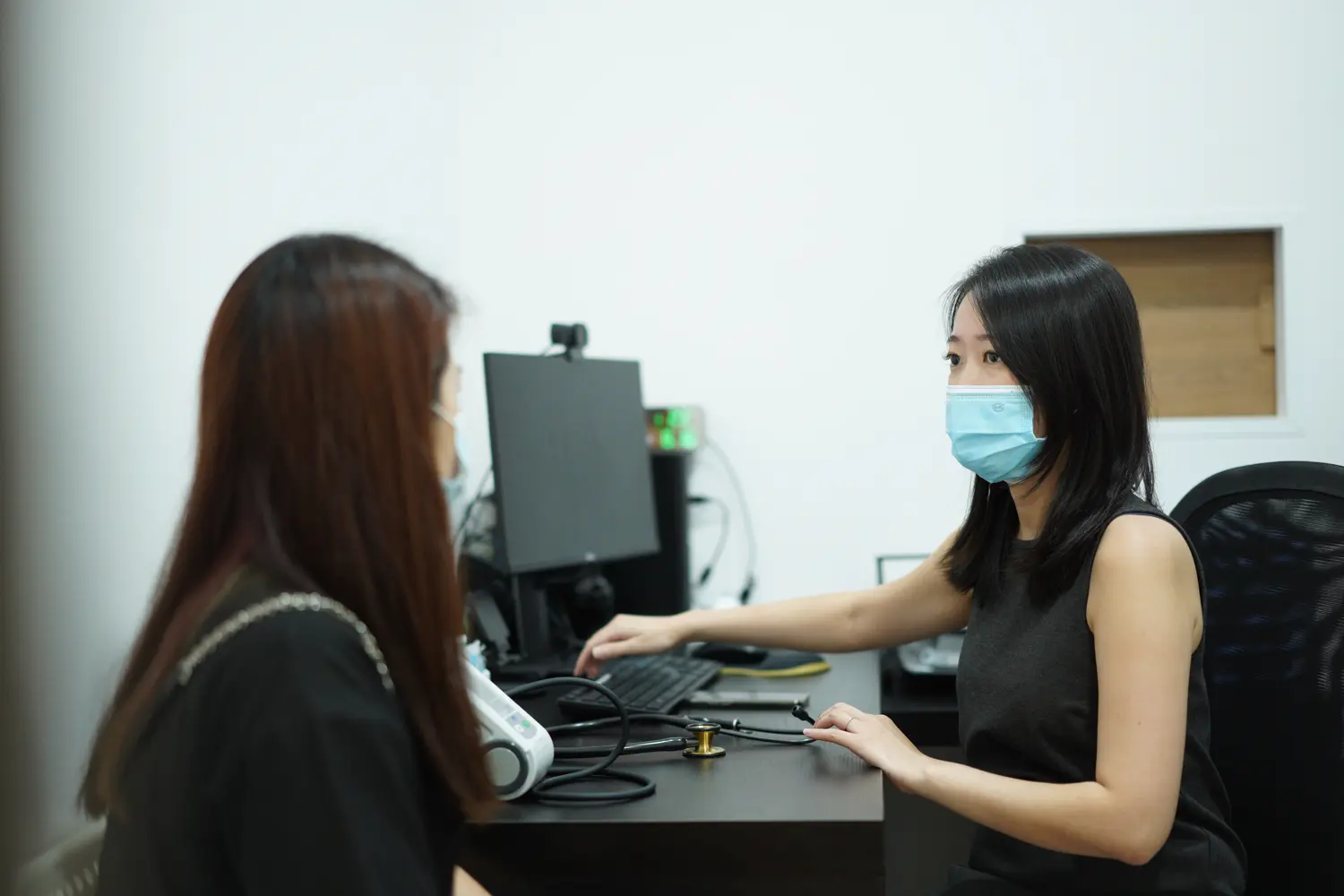Mycoplasma Genitalium (Mgen): Symptoms, Testing, and Treatment
| Mycoplasma Genitalium Test Options |
|
| Price |
|
| Appointment Options |
Same-day appointment (subject to availability). Book via WhatsApp: 8893 3757 or email: hello@healthscreening.sg |
| Clinic Locations |
Orchard: 1 Orchard Blvd
#05-09 Camden Medical Centre, S248649 Tanjong Pagar: 72 Anson Rd #01-02 Anson House, S079911 |
What Is Mycoplasma Genitalium (Mgen)?
Mycoplasma genitalium (Mgen) is a sexually transmitted
bacterial infection that affects the urinary and reproductive systems in both men
and women.
It belongs to a unique group of bacteria known as Mycoplasma, which differ from most bacteria because they
lack a cell wall. This feature makes them naturally resistant to certain antibiotics such as
penicillin. Mgen is specifically transmitted through sexual contact, unlike related
species such as Mycoplasma pneumoniae, which cause respiratory infections like atypical
pneumonia.
Without medical treatment, Mgen is unlikely
to clear on its own and may persist or spread to sexual partners. Persistent infection can
also lead to complications, particularly affecting fertility and reproductive health in women.

How Is Mycoplasma Genitalium Transmitted?
Mgen spreads mainly through unprotected
vaginal, anal, or oral sex. The bacterium is carried in genital secretions and can infect the
urethra, cervix, or rectum. Transmission may occur even when symptoms are not present,
allowing the infection to go unnoticed and continue spreading.
Because it can remain asymptomatic for long periods, Mgen often requires laboratory testing to
detect. Using condoms consistently and getting tested regularly are important ways to reduce the
likelihood of transmission.
What Are Symptoms & Complications of Mycoplasma Genitalium?
Mycoplasma genitalium infection may cause few or no symptoms, which makes early detection challenging. When symptoms appear, they can vary depending on sex and often resemble other common sexually transmitted infections such as chlamydia or gonorrhoea.
| Category | Men | Women |
|---|---|---|
| Symptoms |
|
|
| Complications |
|
|
How Is Mycoplasma Genitalium Diagnosed?
Mgen infection is confirmed through a nucleic acid amplification test (NAAT), which
identifies the bacterium's genetic material in a urine sample or genital
swab.
Testing may be advised when symptoms persist despite treatment for other infections or when
chlamydia and gonorrhoea have been ruled out. Because Mgen often presents without
symptoms, screening may also be considered in cases of unexplained pelvic pain, recurrent
urethritis, or cervicitis.

How Is Mycoplasma Genitalium Treated?
Antibiotics are the primary treatment for Mgen, but increasing antibiotic
resistance has made management more challenging. Treatment may involve one or two types of antibiotics, depending on how resistant the
infection is to certain medications.
If symptoms persist, follow-up testing or resistance testing may be advised to help determine a more
suitable antibiotic. It is essential to complete the prescribed course and return for repeat testing to
ensure the infection has cleared.
Avoiding sexual contact until treatment is complete helps prevent reinfection or transmission to
partners.
How Much Does Mycoplasma Genitalium Testing Cost?
At healthscreening.sg, we provide private and confidential Mgen testing services. The prices are as follows:
| Test | Test Type | Price* |
|---|---|---|
| Consultation | From $49.05 | |
| Urogenital Mycoplasma | Swab / Urine | $65.40 |
| Mycoplasma Genitalium PCR | Swab / Urine | $87.20 |
| Chlamydia & Gonorrhoea PCR | Swab / Urine | $174.40 |
| STD Screening Packages (Female) | ||
|
Enhanced Female Genital Screen (9 tests) Chlamydia, Gonorrhoea, Mycoplasma genitalium, Mycoplasma hominis, Trichomonas, Ureaplasma parvum, Ureaplasma urealyticum, Candida, Gardnerella Vaginosis |
Swab | $348 |
|
Complete Female STD Screen (15 tests) HIV, Syphilis, Hepatitis B, Hepatitis C, Herpes Simplex Virus 1 and 2, Chlamydia, Gonorrhoea, Mycoplasma genitalium, Mycoplasma hominis, Trichomonas, Ureaplasma parvum, Ureaplasma urealyticum, Candida, Gardnerella Vaginosis |
Blood + Swab | $478 |
| STD Screening Packages (Male) | ||
|
Male Genital Screen (8 tests) Chlamydia, Gonorrhoea, Mycoplasma genitalium, Mycoplasma hominis, Trichomonas, Ureaplasma parvum, Ureaplasma urealyticum, Monilia |
Urine | $318 |
|
Complete Male STD Screen (14 tests) HIV, Syphilis, Hepatitis B, Hepatitis C, Herpes Simplex Virus 1 and 2, Chlamydia, Gonorrhoea, Mycoplasma genitalium, Mycoplasma hominis, Trichomonas, Ureaplasma parvum, Ureaplasma urealyticum, Monilia |
Blood + Urine | $428 |
| STD Screening Packages (Female or Male) | ||
|
Enhanced Genital Ulcer Testing (18 tests) HIV, Syphilis (swab + blood test), Hepatitis B, Hepatitis C, Chlamydia, Gonorrhoea, Mycoplasma genitalium, Mycoplasma hominis, Trichomonas, Ureaplasma parvum, Ureaplasma urealyticum, Herpes Simplex Virus 1 and 2, Haemophilus Ducreyi (Chancroid), Cytomegalovirus, Lymphogranuloma, Venereum, Treponema Pallidum (Syphilis), Varicella Zoster Virus |
Blood + Swab | $538 |
*Prices are NETT and inclusive of GST.
Individual or bundled STI testing options
are available depending on your health profile and personal risk factors. Both male and female doctors
are available, subject to availability, to ensure comfort and privacy during your consultation.
If you are unsure which test is most suitable, our doctors can provide medical advice during your visit.
How to Prevent Mycoplasma Genitalium?
Preventing Mgen focuses on safe sexual practices and regular testing. The following steps can help lower your risk:
- Using condoms correctly during sexual activity
- Reducing the number of sexual partners
- Avoiding sexual activity with anyone showing symptoms of an STI
- Undergoing regular STI screening if sexually active, especially with new or multiple partners
- Discussing STI testing openly with partners to support mutual protection
As there is currently no vaccine for Mycoplasma genitalium, maintaining these preventive habits and keeping up with timely screening remain the most effective ways to reduce the risk of infection.

How Do I Book an Appointment for a Mycoplasma Genitalium Test?
Why Choose Us?






Navigate Easy With Google Maps
Health Screening Singapore
(Anson House)
Health Screening Singapore
(Camden Medical Centre)
Frequently Asked Questions (FAQ)
Mycoplasma genitalium is not classified as a urinary tract infection (UTI), although it can cause similar symptoms such as burning during urination. It is a sexually transmitted infection (STI) that affects the urinary and reproductive tracts. Unlike typical UTIs caused by bacteria such as E. coli, Mgen is transmitted through sexual contact and requires specific testing for diagnosis. If you experience urinary symptoms, it is advisable to consult a doctor for evaluation.
There is no single best treatment for Mycoplasma genitalium, as antibiotic resistance differs between strains. Management typically involves one or more antibiotics chosen based on resistance testing and treatment response. Completing the full course of medication and returning for follow-up testing are important to ensure the infection has cleared. If you are experiencing symptoms or suspect Mgen infection, it is advisable to consult a doctor for proper diagnosis and care.
Mycoplasma genitalium is similar to chlamydia in that both are sexually transmitted bacterial infections that can cause genital discharge, pelvic pain, and burning during urination. However, Mgen lacks a cell wall, making it naturally resistant to some antibiotics used for chlamydia. Both infections can lead to complications such as pelvic inflammatory disease if untreated. If you suspect either condition, it is best to seek medical assessment and testing.
Mycoplasma genitalium can become serious if left untreated, as it may cause inflammation, infertility, and other reproductive complications. In women, it is linked to pelvic inflammatory disease and fallopian tube damage, while in men it may lead to urethritis or testicular inflammation. Although often mild or symptom-free, untreated infection can persist and spread. It is advisable to seek medical care if you experience related symptoms or potential exposure.
Individuals who are sexually active with multiple partners or who engage in unprotected sex are at higher risk of Mgen infection. Those with a history of other sexually transmitted infections are also more likely to be affected. Because Mgen often causes no symptoms, regular screening is important for anyone with potential exposure. If you are sexually active and uncertain about your risk, it is best to discuss testing with your doctor.
If left untreated, Mycoplasma genitalium can persist and lead to complications such as inflammation of the urethra in men and pelvic inflammatory disease (PID) or infertility in women. It may also increase the risk of ectopic pregnancy and chronic pelvic pain. Even without symptoms, untreated infection can spread to sexual partners. If you suspect exposure or have persistent symptoms, it is advisable to seek medical evaluation.
Mycoplasma genitalium is triggered by exposure to the bacterium through unprotected sexual activity with an infected partner. It is transmitted via genital fluids during vaginal, anal, or oral sex. The infection itself is not caused by hygiene, diet, or general health factors. Because many people carry Mgen without symptoms, routine STI screening plays an important role in identifying and managing infection early.
Early symptoms of Mycoplasma genitalium can include pain or burning when urinating, abnormal genital discharge, or pelvic discomfort, though many people remain symptom-free. In women, symptoms may also involve bleeding between periods or after sex. As these signs overlap with other STIs like chlamydia or gonorrhoea, proper testing is required for accurate diagnosis. If you experience such symptoms, it is advisable to consult your doctor.
Testing positive for Mycoplasma genitalium means the bacterium is present in your genital or urinary tract and requires antibiotic treatment. As antibiotic resistance is becoming more common, your treatment plan may be adjusted based on resistance testing or how well you respond to medication. Sexual partners may also be advised to undergo testing and treatment to prevent reinfection. Always follow your doctor's guidance on completing treatment and attending follow-up testing.


